Lead epitomises much of my revised thinking on technology, impacts, speech, liability, risk, and other concepts.
See "Leaded petrol is gone – but lead pollution may linger for a very long time" and discussion on @Andrew Pam 's post
I increasingly view technology as a verb: technology is a means, ,a mechanism or process, to some ends. (This borrows heavily from J.S. Mill.) The devices we build as artefacts of technology merely serve to channel and control those processes. Materials and inputs take part in the processes, some are consumed, some are not. We tend to mistake the tangible objects for the intangible process (more on that discussing cognizability).
Impacts
The problem begins when we realise that there are intended and unintended consequences. There's the end we want, and the end we get. All technology has positive and negative impacts, varying with time, cognizability, and expressibility.
Time is the easiest of these three to address: there are short- / near-term effects, and long-term effects. Ends that happen closer to means are easier to recognise and realise.
Cognizability is a somewhat unfashionable word (though you may recognize similarities to others) expressing the ability for a thing to be perceived or known. And for technology, more cognizable effects dominate in social realisation over less cognizable ones. In general, simple, clear, distinct, large, and immediate effects are more cognizable.
Expressability simply means the ease or difficulty of of describing or communicating about a factor. Something that's complex, multi-factored, long-term, subtle, and indistinct, is exceedingly difficult to communicate especially in mass media which relies on a minimum viable audience and a low common level of understanding and perception. There's also the challenge of competing for time and attention within a crowded media sphere.
This gives multiple factors or a matrix defining technological impacts:
X = f(p, n, t, c, e)
Where X is technology (from the Greek chi), p is positive impacts, n is negative impacts, t is time, c is cognizability, e is expressibility.
This also ties strongly to Robert K. Merton's notions of both latent vs. manifest functions, and of unintended consequences.
Risk
Too much to get into here, but I increasingly find discussions of risk to be unsatisfactory. Generally:
Risks have contexts. Individual risk isn't the same as global risk. Your individual risk of dying in an automobile accident may be roughly equal to that of dying in a meteor impact. One is common but small-scale (at least in the current era), one is uncommon but global. But the odds of all of humanity, or all life on Earth, dying in an auto accident is minuscule relative to of dying in a meteor impact. Global catastrophic risks are global. I don't know if it's the Western focus on individualism that gives rise to this fallacy, but I see it constantly.
There's a distinction between randomness and uncertainty. Radioactive decay is random, but (in aggregate) its behaviour is highly certain. Abstract risks, say, of Roko's Basilisk, are highly uncertain. We simply don't know what the probabilities are. (Numerous other "it can only happen once, because once it happens, it's all over" events are similar: global total nuclear war, grey goo, Skynet, global catastrophic logistical collapse, etc.) Treating these as intrinsically similar is ... well, I'm pretty sure it's just plain wrong.
Risks accrue differently to different parties. All life is a risk-externalising mechanism, and within its own domains, market-capitalism is as well. Profits are privatised, risks are socialised, as we've become profoundly aware over the past two decades. This is inherent.
Risks in space differ profoundly from risks in time. Private insurance works best for small-scale risks which occur frequently, at small scale, within a given market, in an uncorrelated fashion. Automobile accidents and house fires are classic examples. Rare, large-area, highly-correlated risks affecting many policyholders simulataneously, are far more difficult to insure against. Wildfires, urban firestorms, earthquakes, major flooding events, sea level rise, cyclonic storms, droughts, and famines are wide-spread events, some are global. Conventional commercial insurance providers fail to address these well if at all. In most cases, "insurance" comes in the way of government (state or national) disaster response, or international aid. An asteroid impact, gamma-ray burst, nearbye supernova, major solar storm, or supervolcano erruption, would be truly global. Global warming moves more slowly but is of a similar nature (as are other global catastrophic risks.)
Liability
Numerous private industries benefitted by use of lead whilst externalising most of the costs and impacts. (Thomas Midgely somewhat infamously was not immune to the effects and did suffer lead poisoning.) More generally, though, investors and creditors faced minimal direct exposure, whilst front-line workers and the public at large, especially in poorer areas more exposed to contamination, bore the brunt.
Profits were privatised, costs socialised.
Speech
Industry and its advocates were strongly motivated to confound the issue. They lied, misled, delayed, and otherwise contaminated not just the physical environment but the epistemological one. It's here that I have some extreme misgivings over popular notions of free speech, in which rights to say anything are at odds with the general public's right to accurate and truthful information. It seems to me that there's a profound conflict here, and a growing problem. It's not one that's easily resolved, though my thinking in terms of #AutonomousCommunication is poking around that space. See here https://joindiaspora.com/posts/622677903778013902fd002590d8e506
(I'm not happy with that term. "Information Autonomy" or "Communication Autonomy" are probably better.)
See also especially Oreskes and Conway, Merchants of Doubt.
#lead #leadedGasoline #environment #contamination #risk #speech #liability #technology #manifestation #RobertKMerton #NaomiOreskes #MerchantsOfDoubt #ErikConway

